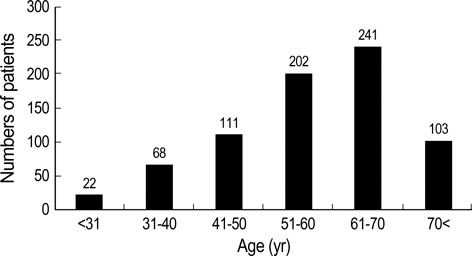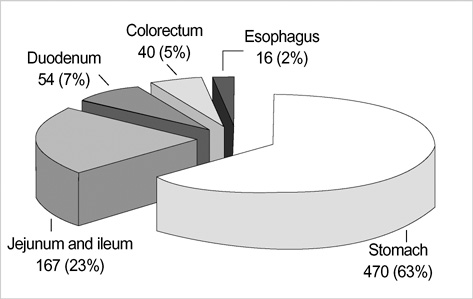Gastrointestinal Stromal Tumors in Koreans: It's Incidence and the Clinical, Pathologic and Immunohistochemical Findings
- Affiliations
-
- 1Department of Pathology, The Catholic University of Korea, Seoul, Korea.
- 2Department of Pathology, Eulji University, Daejeon, Korea.
- 3Department of Pathology, Chunbuk National University, Jeonju, Korea.
- 4Department of Pathology, Catholic University of Daegue, Daegu, Korea.
- 5Department of Pathology, Sungkyunkwan University, Seoul, Korea.
- 6Department of Pathology, Dong-A University, Busan, Korea.
- 7Department of Pathology, Yonsei University Wonju College of Medicine, Wonju, Korea.
- 8Department of Pathology, Soonchunhyang University, Seoul, Korea.
- 9Department of Pathology, Korea University, Seoul, Korea.
- 10Department of Pathology, Chungnam National University, Daejeon, Korea. dykang@cnu.ac.kr
- KMID: 2157748
- DOI: http://doi.org/10.3346/jkms.2005.20.6.977
Abstract
- Seven hundred forty seven cases of gastrointestinal stromal tumors (GISTs) in Koreans who were diagnosed between 2001 and 2002 were analyzed to evaluate their occurrence and their clinical, pathologic and immunohistochemical findings. The most frequent location of tumor was in the stomach (63%), followed by the small intestine (30%), the colorectum (5%), and the esophagus (2%). c-kit expression was found in 93.6% of the cases, while CD34, SMA and S-100 protein was positive in 80.1%, 28.2%, and 20.2%, respectively. c-kit positivity was high in the stomach (94.2%) and small intestine (94.6%), while it was relatively low in the colorectum (85.0%), and esophagus (81.2%). The positivity for CD34 was correlated with the higher risk of GISTs (p=0.04). Follow up of the patients showed that 58 primary GISTs patients died and 20 of these patients were recurrent or metastatic at the time of diagnosis. The pathologic diagnosis to predict the risk of aggressive behavior of GISTs was correlated with the numbers of tumor, clinical stage, epithelioid histologic type, cellularity, cellular atypia, necrosis, and mucosal invasion (p= 0.00). GISTs with a poor prognosis were closely related to the clinical stage at presentation, the locations of the tumor, and the ages of the patients.
Keyword
MeSH Terms
-
Actins/metabolism
Adolescent
Adult
Aged
Aged, 80 and over
Antigens, CD34/metabolism
Child
Female
Gastrointestinal Stromal Tumors/*epidemiology/metabolism/pathology
Humans
Immunohistochemistry
Korea/epidemiology
Male
Middle Aged
Prognosis
Proto-Oncogene Proteins c-kit/metabolism
Research Support, Non-U.S. Gov't
S100 Proteins/metabolism
Figure
Cited by 6 articles
-
Clinical Practice Guideline for Accurate Diagnosis and Effective Treatment of Gastrointestinal Stromal Tumor in Korea
Yoon-Koo Kang, Kyoung-Mee Kim, Taesung Sohn, Dongil Choi, Hye Jin Kang, Min-Hee Ryu, Woo Ho Kim, Han-Kwang Yang
J Korean Med Sci. 2010;25(11):1543-1552. doi: 10.3346/jkms.2010.25.11.1543.Current Trends in the Epidemiological and Pathological Characteristics of Gastrointestinal Stromal Tumors in Korea, 2003-2004
Mee-Yon Cho, Jin Hee Sohn, Joon Mee Kim, Kyoung-Mee Kim, Young Su Park, Woo Ho Kim, Jin Sook Jung, Eun Sun Jung, So-Young Jin, Dae Young Kang, Jae Bok Park, Ho Sung Park, You Duck Choi, Sun Hee Sung, Young-Bae Kim, Hogeun Kim, Young-Kyung Bae, Miseon Kang, Hee Jin Chang, Yang Seok Chae, Hee Eun Lee, Do Youn Park, Youn Soo Lee, Yun Kyung Kang, Hye Kyung Kim, Hee-Kyung Chang, Soon Won Hong, Young Hee Choi, Okran Shin, MiJin Gu, Youn Wha Kim, Gwang Il Kim, Sei Jin Chang
J Korean Med Sci. 2010;25(6):853-862. doi: 10.3346/jkms.2010.25.6.853.Clinical Practice Guideline for Adequate Diagnosis and Effective Treatment of Gastrointestinal Stromal Tumor in Korea
Yoon-Koo Kang
J Korean Med Assoc. 2007;50(9):830-841. doi: 10.5124/jkma.2007.50.9.830.Contrast Enhanced Harmonic Endoscopic Ultrasound: A Novel Approach for Diagnosis and Management of Gastrointestinal Stromal Tumors
Ankit Chhoda, Deepanshu Jain, Venkateswar R Surabhi, Shashideep Singhal
Clin Endosc. 2018;51(3):215-221. doi: 10.5946/ce.2017.170.Clinical Practice Guideline for Accurate Diagnosis and Effective Treatment of Gastrointestinal Stromal Tumor in Korea
Yoon-Koo Kang, Hye Jin Kang, Kyoung-Mee Kim, Taesung Sohn, Dongil Choi, Min-Hee Ryu, Woo Ho Kim, Han-Kwang Yang,
Cancer Res Treat. 2012;44(2):85-96. doi: 10.4143/crt.2012.44.2.85.Asian Consensus Guidelines for the Diagnosis and Management of Gastrointestinal Stromal Tumor
Dong-Hoe Koo, Min-Hee Ryu, Kyoung-Mee Kim, Han-Kwang Yang, Akira Sawaki, Seiichi Hirota, Jie Zheng, Bo Zhang, Chin-Yuan Tzen, Chun-Nan Yeh, Toshirou Nishida, Lin Shen, Li-Tzong Chen, Yoon-Koo Kang
Cancer Res Treat. 2016;48(4):1155-1166. doi: 10.4143/crt.2016.187.
Reference
-
1. Miettinen M, Lasota J. Gastrointestinal stromal tumors (GISTs): definition, occurrence, pathology, differential diagnosis and molecular genetics. Pol J Pathol. 2003. 54:3–24.2. Corless CL, Fletcher JA, Heinrich MC. Biology of gastrointestinal stromal tumors. J Clin Oncol. 2004. 22:3813–3825.
Article3. Hirota S, Isozaki K, Moriyama Y, Hashimoto K, Nishida T, Ishiguro S, Kawano K, Hanada M, Kurata A, Takeda M, Muhammad Tunio G, Matsuzawa Y, Kanakura Y, Shinomura Y, Kitamura Y. Gain-of-function mutations of c-kit in human gastrointestinal stromal tumors. Science. 1998. 279:577–580.
Article4. Lasota J, Jasinski M, Sarlomo-Rikala M, Miettinen M. Mutations in exon 11 of c-Kit occur preferentially in malignant versus benign gastrointestinal stromal tumors and do not occur in leiomyomas or leiomyosarcomas. Am J Pathol. 1999. 154:53–60.
Article5. Miettinen MM, Sarlomo-Rikala M, Kovatich AJ, Lasota J. Calponin and h-caldesmon in soft tissue tumors: consistent h-caldesmon iommunoreactivity in gastrointestinal tumors indicates traits of smooth muscle differeutiation. Mod Pathol. 1999. 12:756–762.6. Kindblom LG, Remotti HE, Aldenborg F, Meis-Kindblom JM. Gastrointestinal pacemaker cell tumor (GIPACT): gastrointestinal stromal tumors show phenotypic characteristics of the interstitial cells of Cajal. Am J Pathol. 1998. 152:1259–1269.7. Sakurai S, Fukasawa T, Chong JM, Tanaka A, Fukayama M. Embryonic form of smooth muscle myosin heavy chain (SMemb/MHC-B) in gastrointestinal stromal tumor and interstitial cells of Cajal. Am J Pathol. 1999. 154:23–28.
Article8. Rubin BP, Singer S, Tsao C, Duensing A, Lux ML, Ruiz R, Hibbard MK, Chen CJ, Xiao S, Tuveson DA, Demetri GD, Fletcher CD, Fletcher JA. KIT activation is a ubiquitous feature of gastrointestinal stromal tumors. Cancer Res. 2001. 61:8118–8121.9. Miettinen M, Lasota J. Gastrointestinal stromal tumors; definition, clinical, histological, immunohistochemical, and molecular genetic features and differential diagnosis. Virchows Arch. 2001. 438:1–12.10. Miettinen M, Sarlomo-Rikala M, Lasota J. Gastrointestinal stromal tumors: recent advances in understanding of their biology. Hum Pathol. 1999. 30:1213–1220.
Article11. Miettinen M, Furlong M, Sarlomo-Rikala M, Burke A, Sobin LH, Lasota J. Gastrointestinal stromal tumors, intramural leiomyomas, and leiomyosarcomas in the rectum and anus: a clinicopathologic, immunohistochemical, and molecular genetic study of 144 cases. Am J Surg Pathol. 2001. 25:1121–1133.12. Miettinen M, Kopczynski J, Makhlouf HR, Sarlomo-Rikala M, Gyorffy H, Burke A, Sobin LH, Lasota J. Gastrointestinal stromal tumors, intramural leiomyomas, and leiomyosarcomas in the duodenum: a clinicopathologic, immunohistochemical, and molecular genetic study of 167 cases. Am J Surg Pathol. 2003. 27:625–641.
Article13. Heinrich MC, Corless CL, Duensing A, McGreevey L, Chen CJ, Joseph N, Singer S, Griffith DJ, Haley A, Town A, Demetri GD, Fletcher CD, Fletcher JA. PDGFRA activating mutations in gastrointestinal stromal tumors. Science. 2003. 299:708–710.
Article14. Hirota S, Ohashi A, Nishida T, Isozaki K, Kinoshita K, Shinomura Y, Kitamura Y. Gain-of-function mutations of platelet-derived growth factor receptor alpha gene in gastrointestinal stromal tumors. Gastroenterology. 2003. 125:660–667.15. Miettinen M, Majidi M, Lasota J. Pathology and diagnostic criteria of gastrointestinal stromal tumours (GISTs): a review. Eur J Cancer. 2002. 38:Suppl 5. 39–51.16. Rudolph P, Chiaravalli AM, Pauser U, Oschlies I, Hillemanns M, Gobbo M, Marichal M, Eusebi V, Hofler H, Capella C, Kloppel G. Gastrointestinal mesenchymal tumors-immunophenotypic classification and survival analysis. Virchows Arch. 2002. 441:238–248.17. Fletcher CD, Berman JJ, Corless C, Gorstein F, Lasota J, Longley BJ, Miettinen M, O'Leary TJ, Remotti H, Rubin BP, Shmookler B, Sobin LH, Weiss SW. Diagnosis of gastrointestinal stromal tumors: A consensus approach. Hum Pathol. 2002. 33:459–465.
Article18. Emory TS, Sobin LH, Lukes L, Lee DH, O'Leary TJ. Prognosis of gastrointestinal smooth-muscle (stromal) tumors: dependence on anatomic site. Am J Surg Pathol. 1999. 23:82–87.19. O'Leary T, Berman JJ. Gastrointestinal stromal tumors: answers and questions. Hum Pathol. 2002. 33:456–458.20. Kim MK, Lee JK, Park ET, Lee SH, Seol SY, Chung JM, Kang MS, Yoon HK. Gastrointestinal stromal tumors: clinical, pathologic features and effectiveness of new diagnostic criteria. Korean J Gastroenterol. 2004. 43:341–348.21. Lee EJ, Lee OJ, Kim TH, Jung WT. A clinical and immunohistochemical study on gastrointestinal stromal tumor. Korean J Gastroenterol. 2003. 42:204–211.22. Kim TW, Lee H, Kang YK, Choe MS, Ryu MH, Chang HM, Kim JS, Yook JH, Kim BS, Lee JS. Prognostic significance of c-kit mutation in localized gastrointestinal stromal tumors. Clin Cancer Res. 2004. 10:3076–3081.
Article24. Kang DW, Kim JH, Kim DH, Kim KH, Park MJ, Kang DY. c-kit mutation and immunohistochemical expression in gastrointestinal stromal tumors. Korean J Pathol. 2003. 37:246–254.25. Ryu JS, Lee SR, Choi SB, Park SS, Lee JH, Kim SJ, Kim CS, Chae YS, Mok YJ. Gastrointestinal stromal tumor (GIST) of the stomach: clinicopathologic analysis and outcome? J Korean Gastric Cancer Assoc. 2005. 5:40–46.
Article26. Kwon SJ. Korean Gastric Cancer Study Group. Surgery and prognostic factors for gastric stromal tumor. World J Surg. 2001. 25:290–295.
Article27. Park SH, Kim MK, Kim HS, Song BJ, Chi JG. Ultrastructyral studies of Gastrointestinal stromal tumors. J Korean Med Sci. 2004. 19:234–244.28. Yantiss RK, Spiro IJ, Compton CC, Rosenberg AE. Gastrointestinal stromal tumor versus intra-abdominal fibromatosis of the bowel wall. Am J Surg Pathol. 2000. 24:947–957.
Article29. Sircar K, Hewlett BR, Huizinga JD, Chorneyko K, Berezin I, Riddell RH. Interstitial cells of Cajal as precursors of gastrointestinal stromal tumors. Am J Surg Pathol. 1999. 23:377–389.
Article30. Wang L, Vargas H, French SW. Cellular origin of gastrointestinal stromal tumors: a study of 27 cases. Arch Pathol Lab Med. 2000. 124:1471–1475.31. Miettinen M, Sobin LH, Sarlomo-Rikala M. Immunohistochemical spectrum of GISTs at different sites and their differential diagnosis with a reference to CD117 (KIT). Mod Pathol. 2000. 13:1134–1142.
Article
- Full Text Links
- Actions
-
Cited
- CITED
-
- Close
- Share
- Similar articles
-
- Interpretation of Pathologic Margin after Endoscopic Resection of Gastrointestinal Stromal Tumor
- Gastrointestinal Stromal Tumor with Extensive Lymphatic Metastasis: A Case Report
- Primary Extragastrointestinal Stromal Tumor of Retroperitoneum: Poor Response to Tyrosine Kinase Inhibitor
- Gastrointestinal Stromal Tumor of Prostate
- Multiple Gastrointestinal Stromal Tumors of the Small Intestine







